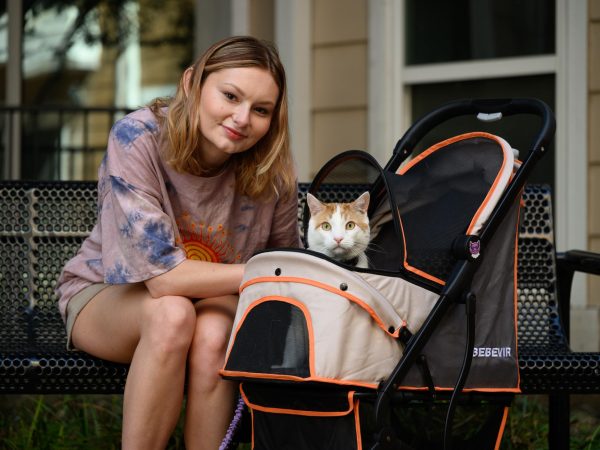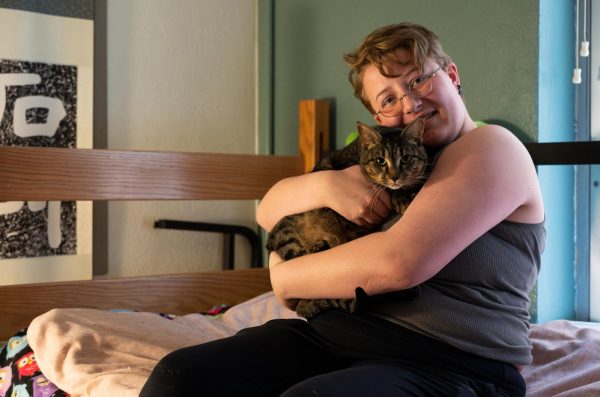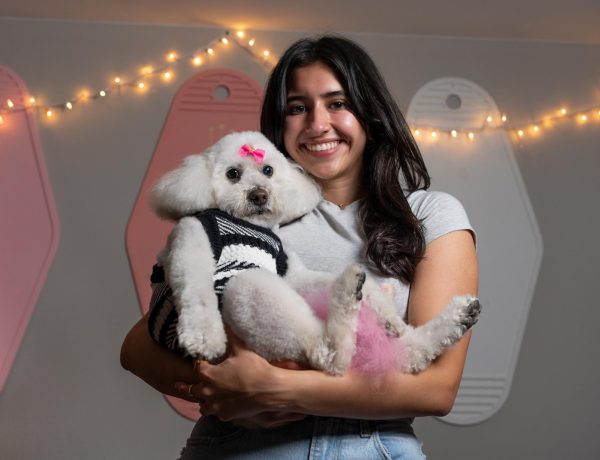Editor’s note: This podcast was originally uploaded to Spotify on April 11, 2024.
In the midst of stressful college life, UT students find comfort in the form of furry friends with their emotional support animals, or ESAs.
In this episode, Audio Producer Mercy Solis talks to three ESA owners to learn about them and their pets.
Reported and produced by Mercy Solis, with additional editing done by Aislyn Gaddis. Cover art is by Analise Pickerrell and is based on portraits by Manoo Sirivelu. Music is Chevalet by idokay.
*upbeat music*
Kylie Sisk: He’s just allowed me to be able to have an outlet and he really just gets my mind off of any stressor or hectic things going on. I know that no matter how busy or crazy the outside world is, I can come home and he’s just joy and love.
Kylie: His name is Leo Prince, and he is a cat.
Mercy Solis: Leo’s middle name is incredibly fitting because he is the prince of his household. The west campus apartment is riddled with Leo memorabilia. He is loved and spoiled by a UT sophomore, Kylie Sisk.

Kylie: I originally just got him as a pet. And then I wasn’t even going to take him to college. And then about a month before I moved to Austin, I decided that I couldn’t leave him. And I went through the process of getting him certified and registered as an emotional support animal.
Mercy: Emotional support animals or ESAs are prescribed by a mental health professional for varying mental illness or neurodivergence. They’re sometimes confused for service animals, but do not require the special training that service animals do, and are not allowed in spaces where service animals are. According to Mental Health America, ESAs are covered under the Fair Housing Act and are allowed in homes, even if there is a “no pet” policy, and owners cannot be charged pet fees. Leo is one of the many emotional support animals belonging to UT students. With the rise of mental health concerns for college students, a fluffy companion provides relief for many.
Kylie: Leo is my best friend. As cliche and this probably isn’t good. He’s like my reason to live like I love him. I love my cat. We’re like this [she crosses her fingers]
Mercy: Leo is more than an emotional support animal, he is a cat of many talents.
Kylie: He’s very food motivated if you haven’t… haven’t seen but yeah just like slowly up just like slowly realizing he could do them I think set like came pretty easily for him and then I just like got him to shake and learn a whole bunch of tricks – twirl.
Mercy: He has even learned some English, well one word.
*angry out out out button noises by Leo*
Mercy: That is Leo’s “out” button. He knows to press it when he wants to be let outside.
Kylie: Like back at home is when I mainly used this one and because he would really be able to go outside and at the front door he would sit there and sit there and sit there and he would meow meow and meow and he would never want to press it and you knew if he pressed it he was really angry
Mercy: Leo is not your average cat in more than one way.
Kylie: I have a stroller for him. I take him on walks. So I really think just like challenging the stereotypes of even cats in general. So going on walks with him and teaching him tricks. And he really enjoys people. He’s loved and he’s treated with respect, and he goes on walks and he gets to communicate with people. And yeah, I would say that having an emotional support animal has made my experience at college just that more enjoyable.
Mercy: The relationships owners have with their emotional support animals goes far beyond what is shown on the surface.
Zen Marks: She has saved my life more than once. The reason I was recommended to get an ESA in the first place was because I really, really, really struggled to find reasons to stay alive at times, even if it’s just the most minute reasons like I have to be here to feed Freyja tomorrow. Those are the types of things that keep me alive.
Mercy: That’s Zen Marks, a college sophomore who stays at the dorms, sharing his experience with a fluffy roommate.
Zen: She’s an emotional support animal but this is Freyja spelled F-R-E-Y-J-A. She’s a tabby cat and she’s fat and I love her.
Mercy: Some people might roll their eyes at the idea of a pet being a reason to live.
Zen: Oh, yeah, it sounds so silly. To anyone who hasn’t experienced it. But just the most minute of reasons can help you stay alive. You know, I have to be here to feed her. And my therapist was like, Yeah, you either get a cat or you go to the grippy sock Emporium. So, I was like, Yeah, I’m gonna cat.
Mercy: I’m sorry. The what?
Zen: I have a deep fear of hospitals. And so we use any term but hospital to refer to it. So we call it the grippy sock Emporium.
Mercy: Oh.. Okay!
Mercy: His decision to adopt Frejya has given Zen a sense of relief that is not possible from humans.
Zen: It is one of the most personally healing experiences of like having her lay on me or having her like, trust me. Because it’s hard to tell when people trust you I find, especially being autistic. I have trouble reading people. But I know when she trusts me, and that’s a really healing feeling.
*sound of Coco’s nails on the wooden floor*
Mercy: That’s Coco approaching, a small mostly-white dog. Her tail is dyed pink, which is impossible not to smile at. Chistina Adams, a junior human biology major, ensures to keep Coco’s tail dyed pink at all times.
Christina Adams: I feel like people really do benefit from even just seeing Coco and like it could just be like something like seeing them just distracts them from like, the negative things going on with your life and I love that. And I feel like Coco is such a light in my life have to share that with others. And ever since then, like we’ve kept it pink.
Mercy: Christina registered Coco as an emotional support animal the summer after her freshman year due to ongoing anxiety at the time.
Christina: It was a fairly seamless process. It wasn’t like it was something that I went on my way to do. It was kind of something offered to me by my doctor because of the anxiety I was having about not being able to live with Coco in my apartment.
Mercy Solis: Coco enjoys flaunting her pink tail all around Austin.
Christina: I take Coco to places that allow like animals or like parks that you know specifically say that dogs got off-leash, Home Depot, you could bring a dog there. And I think the main thing that I like I love about Austin, in that I’m proud to say that this like Austin is a city that you know profits off of like entertainment and outdoors. And so most places are really dogs. Like there’s so many dog-friendly like restaurants or places that have a patio where they’ll like allow you to have a dog.
Mercy: Christina also understands the importance of leaving Coco at home when necessary.
Christina: I think the biggest misconception around emotional support animals is that they’re allowed anywhere. I would love to bring my dog to Target as much as I think anyone else would, but as I got older I noticed that there is other people that bring their service animals that really need their dogs to pick up on cues and help their handler whenever something is going on and bringing a pet into a store where they are could potentially put their lives at risk.
Mercy: She has a particular passion for people who falsely register their pets as emotional support animals or even service animals
Christina: And so for me whenever I see people that clearly don’t have like a registered service animal, just like acting a fool with their dog, there’s just really no excuses because there’s so many places that you take a dog and like, especially the grocery store. There’s outdoors, outdoor farmers markets, like here in Austin. Like, there’s really just no excuse why you really need to bring your dog to the store with you. Like you’d always just like, make the drive and take them home and then go do whatever task you want to do.
Mercy: Christina has another grievance… dog poop.
Christina: I feel like whenever I walk Coco, I’m constantly stepping in like some of the dog’s poop or Coco stepping in some other dog’s poop. And it’s just like such an inconvenience, or even on the elevator, elevator ride up or down. There was dog poop in the lobby, or like not the lobby and elevator.
Mercy: I have a theory that somebody’s walking a Great Dane and letting it poop everywhere. Because…
Christina: Honestly
Mercy: that’s what it feels like.
Christina: I would love to like, see, like a decrease in dog poop. Here in West Campus. I think something that people should take into account before they go about exploring, registering their dogs as an emotional support animal or service animal would be to really outweigh like the consequences of like not taking care of the animal. And we evaluate this as something that they really need and benefit from before they go back to it. Because they could potentially make it harder for people who do need them to obtain them.
Mercy: Leo, Frejya, and Coco refused to comment
Mercy: Frejya, anything you’d like to add?….
Thank you.
Mercy: From what I’ve learned though, Coco loves the attention, so if you see a white fluffy dog with a pink tail, make sure you say hi. You might see Frejya out on a walk or Leo gazing out the balcony, whatever it may be, remember to remain respectful and please pick up your dog’s poop!
*upbeat outro music*
Mercy: This has been a production of The Daily Texan Audio Department. If you like this episode, make sure you subscribe to The Daily Texan on your streaming platform of choice and follow us on Twitter @texanaudio. This episode was hosted by me, Mercy Solis. Editing was done by me and Aislyn Gaddis. Accompanying pictures were taken by Manoo Sirivelu, and cover art was done by Analise Pickerrell. To read the news stories in this episode or see more from the Texan, head on over to www.thedailytexan.com. Thanks for listening!














